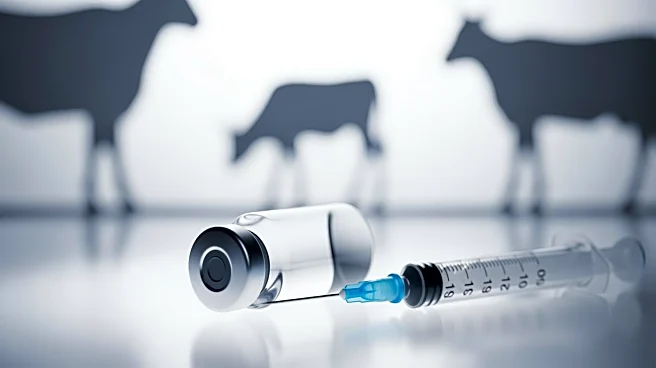What's Happening?
The South African government has initiated a large-scale vaccination campaign to combat the ongoing foot-and-mouth disease (FMD) outbreak affecting the country's livestock industry. Agriculture Minister John Steenhuisen has declared the situation a crisis,
prompting the procurement of over 1.5 million doses of SAT-strain FMD vaccine from the Botswana Vaccine Institute. The campaign aims to protect vital livestock facilities, such as Sparta Beef in Marquard and Alma farm in Clocolan, which have already vaccinated all cattle. The spread of the disease through infected animal movement has led industry leaders to question the current reactive vaccination approach, suggesting a shift to a regionally coordinated strategy.
Why It's Important?
The FMD outbreak poses a significant threat to South Africa's agricultural sector, which is crucial for the country's economy and food security. The aggressive vaccination campaign is essential to prevent further spread and protect the livestock industry from severe economic losses. The dependency on foreign vaccines highlights the need for local vaccine production to ensure self-sufficiency and resilience against future outbreaks. The success of this campaign could lead to systemic changes in disease management and strengthen the agricultural sector's ability to respond to similar crises.
What's Next?
The government plans to establish a task team to oversee the vaccination drive and improve animal identification and tracking systems to control livestock movement. There is a growing call for local vaccine production to reduce dependency on foreign sources. The campaign's success will be measured not only by the number of doses administered but also by the ability to build a more resilient agricultural system. The detection of 'canyon fever' in the Northern Cape adds urgency to these efforts.
Beyond the Headlines
The FMD outbreak and vaccination campaign underscore the systemic vulnerabilities in South Africa's agricultural sector. The crisis highlights the importance of developing local vaccine production capabilities and improving disease management strategies. The situation serves as a reminder of the need for a more proactive approach to prevent future outbreaks and ensure the sector's long-term sustainability.















